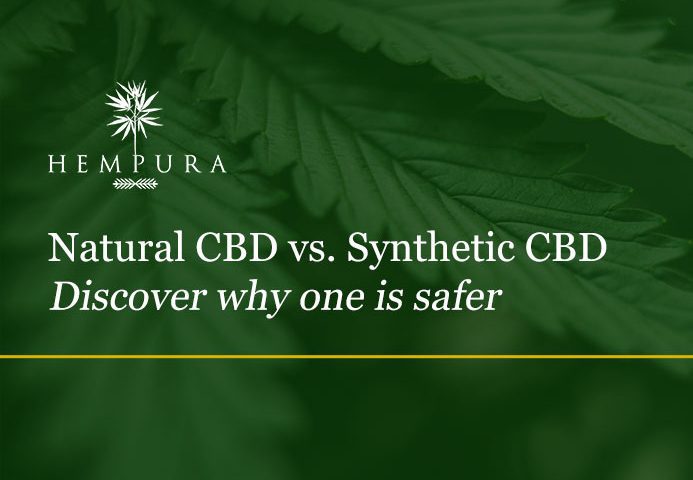Hempura’s Natural CBD vs Synthetic CBD
To some CBD manufacturers, synthetic Cannabidiol (CBD) may seem like a good idea – it is incredibly cheap to manufacture, and it can therefore be cheap to purchase and charge high prices for, but at what cost?
There are many CBD oils appearing on the UK market that are advertised as ‘pure CBD’ without advertising they have been manufactured using synthetic CBD.
Synthesized products are not natural products at all, but instead are a mixture of often low-cost and often volatile chemicals designed to imitate “the DNA” of this highly beneficial organic compound.
The benefits of CBD oil extracts from Cannabis Sativa (Industrial Hemp) are not just restricted to the cannabidiol content.
A high quality, naturally derived CBD oil also contain terpenes, Omega 3 and 6 essential fatty acids (which have a range of different health and wellbeing properties that include contributing to heart and brain health[1]) as well as a range of other beneficial phytonutrients and hemp constituents, so it is incredibly challenging to effectively and safely ‘mimic’ the full range of organic compounds in Industrial Hemp by using synthesized chemicals.
In addition to this, some of the chemicals used to synthesise CBD are incredibly toxic and are often at detectable levels.
Take heptane, for example, which is used in the manufacturing process for some synthetic cannabidiol products[2], and which is a flammable, hazardous chemical commonly linked to side effects including headache, lightheadedness, lack of coordination and loss of consciousness, as well as a variety of serious chronic health effects that can be linked to prolonged exposure.[3]
The residual n-Heptane solvent has been shown as detectable by the CoA of a synthetic CBD manufacturer, as shown below:

Figure 1 – Snippet from a Certificate of Analysis from an unnamed Synthetic CBD manufacturer showing detectable N-heptane
Why was CBD synthesised?
Cannabidiol (CBD) was first synthesised by Raphael Mechoulam in 1965[4]. Mechoulam was attempting to learn more about the properties and characteristics of CBD and other cannabinoids.
Synthesising these compounds often made it easier for researchers to investigate cannabinoids within the law, regardless of the legality of Cannabis Sativa variants in the country they were working in.
John Huffman, a Chemistry Professor at Clemson University in South Carolina, also synthesised cannabinoids as part of a research project, but in 2010 found that his synthesised chemical cannabinoids had been hijacked for non-scientific purposes[5].
The synthetic cannabinoids he had created were being re-created and sold by unscrupulous manufacturers and retailers to individuals who wanted to experience the psychoactive effects of the cannabinoids THC and CBN as an apparently ‘legal’ high (as at that point these products fell outside of drug regulations).
This synthetic cannabinoid – JWH-018 – and several other synthetic cannabinoids have now been banned for sale and use in both the US and UK[6].
Though there are some synthetic CBD products available on the market that are still legal for sale, it is important to be aware of some of the concerns around these synthesised products.
Are synthetic cannabinoids safe?
Some synthesised cannabinoids that have been ingested by humans have proven incredibly dangerous.
The US Centre for Disease Control and Prevention describes the fact that “The health effects from using synthetic cannabinoids can be unpredictable and harmful—even life-threatening” and cites examples from Illinois of multiple cases of severe bleeding, and some deaths, which were directly linked to the ingestion of contaminated synthetic cannabinoids[7].
Wider studies have also shown that synthetic cannabinoids are associated with higher rates of toxicity and hospital admissions than natural cannabis Sativa derived products[8] and can result in symptoms such as tachycardia, agitation, hallucination, hypertension, the minor elevation of blood glucose, hypokalaemia and vomiting as well as chest pain, seizures, myoclonia and acute psychosis.
It is not only what synthetic cannabinoids can do that is important to note – it is what they cannot do: Cannabidiol (CBD) has been noted for its anti-inflammatory effects due to the way it interacts with mast cells.
However, there is some evidence to suggest that synthetic cannabinoids do not interact with mast cells in the same way.
Nature at its best
Here at Hempura, it’s the unique organic characteristics of the Cannabis Sativa (Industrial Hemp) that we use in our CBD products that we love most about our all-natural ingredients; the flavour profile can change subtly from harvest to harvest, and our full spectrum original extract oil, in particular, has a deep, earthy flavour and is free from artificial additives, just as nature intended!
Though the flavour profile can vary, every harvest is carefully lab tested to ensure that it meets strict regulations about THC and CBN content to ensure compliance and legality with fast-changing and strict industry standards.
Our extraction method is also carefully designed to optimise the natural characteristics of the Cannabis Sativa Industrial Hemp that we process for our CBD products.
We use an advanced ethanol extraction method, rather than CO2 extraction, which helps to preserve the naturally occurring terpenes, flavonoids, cannabinoids, nutrients, and minerals present in the plant so that our customers can benefit from the wide range of wellbeing properties delivered by the combination of all these compounds, not just cannabidiol.

Figure 2 – Hempura Certificate of Analysis showing absence of n-Heptane, completely undetectable Solvents or Heavy Metals
Our CBD products are vegan and lactose-free and are organically grown from trusted EU farms.
For us, your safety and wellbeing are our highest priority, which is why we champion a natural rather than an artificial approach to CBD products. To view our full range of products, you can visit our online shop here.
References
[1] https://ods.od.nih.gov/factsheets/Omega3FattyAcids-HealthProfessional/
[2] https://patents.google.com/patent/WO2019046806A1/en
[3] https://nj.gov/health/eoh/rtkweb/documents/fs/1339.pdf
[4] https://www.ncbi.nlm.nih.gov/pmc/articles/PMC1760722/
[5] https://www.ncbi.nlm.nih.gov/pmc/articles/PMC3567606/
[6] https://www.gov.uk/government/publications/circular-0092019-third-generation-synthetic-cannabinoids-update/circular-0092019-third-generation-synthetic-cannabinoids-update
[7] https://www.cdc.gov/nceh/hsb/chemicals/sc/default.html
[8] https://www.sciencedirect.com/science/article/abs/pii/S0002962915412170
Last Updated on 11/03/2022





